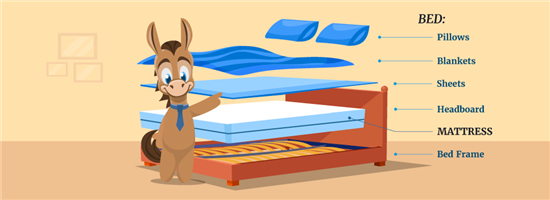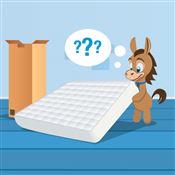Differences Between Bed and Mattress
What's the difference between a bed and mattress? Find out how they compare and learn about the best mattresses for you.
 |
When you're shopping for a new bed or mattress, the jargon can be confusing.
The good news is you don't have to be an expert to understand how to pick the best mattress.
Check out this cheat sheet to tell the key differences between beds and mattresses. Plus, learn which mattresses offer hotel quality and back pain relief.
What's the Difference Between a Bed and a Mattress?
A bed is the entire piece of furniture you sleep on at night. It includes the bed frame, mattress, headboard, sheets, pillows, and blankets.
The bed frame is the sturdy metal or wooden platform that supports your mattress. The mattress is the comfortable, cushioned part you lie on.
If you simply slept with your mattress on the floor, that could technically be considered your bed. But a bed will usually have a frame that supports your mattress above the ground. This is recommended to give your mattress proper support and airflow.
Most people don't need to replace their entire bed very often. You'd most likely just get a new mattress or new bedding if you wanted to refresh your bedroom.
Mattresses can really affect your sleep quality. So if you're looking to replace your old mattress, make sure to familiarize yourself with the different types of mattresses.
A cot is a simple, foldable camping bed. It's usually quite small and can only comfortably accommodate one person. A cot can also refer to a toddler's crib if you're in the U.K.
A bed usually refers to the permanent fixture in your bedroom that you sleep on every night.
Differences Between Mattresses
What's the difference between a foam mattress and a spring mattress? Find out which is better down below.
1. Memory Foam
- Average Price (Queen): $600 - $1,000
- Lifespan: 8 - 10 years
- Best for side sleepers and back pain
Memory foam mattresses are one of the most popular mattress types. These are usually one of the most affordable mattresses, so you'll find them everywhere.
Many budget-friendly brands sell memory foam mattresses since they're relatively cheap to make. A queen mattress will run you anywhere from $600 to $1,000 on average.
The material hugs your body and conforms to your curves. An all-foam mattress won't have the best support out of all the mattress types. But it's one of the best materials for pressure relief because it allows your pressure points to sink in.
Memory foam is great for back pain since it conforms to your body without adding additional strain. Side sleepers also tend to love memory foam because it feels soft around the shoulders and hips.
2. Innerspring
- Average Price (Queen): $600 - $1,000
- Lifespan: 7 - 9 years
- Best for back sleepers
Innerspring mattresses are the original mattress type you probably grew up with. Ever jumped on a bouncy, trampoline-like mattress? That was probably an innerspring mattress.
These days, innerspring are a lot less bouncy—which is great if you sleep with a partner. Even if your partner tosses and turns at night, the motion won't bounce over to your side of the bed.
Innerspring mattresses cost about the same as foam mattresses, but they usually wear out faster than foam. Steel springs are strong, but the wires compress over time and can start to sag after a couple years.
Innerspring is a great choice for back sleepers since the coils give great support. Unlike foam, which can feel mushy, innerspring mattresses have a nice bounce that keeps you lying on the mattress, not in the mattress.
3. Pillow Top
- Average Price (Queen): $700 - $1,200
- Lifespan: 6 - 8 years
- Best for hotel mattress feel
Pillow top mattresses are a type of innerspring mattress with an extra layer of cushion sewn to the top. This gives a more luxurious feel than your typical innerspring mattress.
Pillow top mattresses usually cost a little more than regular innerspring mattresses due to the extra material. These mattresses have a slightly shorter lifespan since the pillow top padding usually wears down first. Your mattress will still be usable, but it just won't feel as plush.
If you're searching for a mattress that feels like a fancy hotel bed, pillow tops are a great option. The added lift and cloud-like comfort often feels a lot more high-end than it costs.
4. Hybrid
- Average Price (Queen): $1,200 - $1,600
- Lifespan: 8 - 10 years
- Best for combination sleepers
Hybrid mattresses have gained a lot of popularity. Like its name suggests, these versatile mattresses are made up of multiple mattress types. The most common hybrids have layers of foam on top of an innerspring support system.
The term can be a bit confusing since most innerspring mattresses have a bit of foam in them. The key to a true hybrid mattress is that it has thick layers of foam. This is supposed to let you reap the benefits of pressure-relieving foam and supportive innersprings.
Hybrids use more materials, so they're usually on the pricier side. An average queen mattress can cost between $1,200 and $1,600.
These are great for all sleep positions. If you like to sleep on your side, your stomach, and your back, a hybrid can help keep you supported all night.
GhostBed Flex - Luxury Hybrid Mattress
5. Latex
- Average Price (Queen): $1,500 - $2,000
- Lifespan: 10+ years
- Best for reducing allergies
Latex mattresses are actually a type of foam mattress, but it feels a lot different than memory foam. Latex tends to feel springier and more responsive, despite not having any innersprings.
This material has a lot of benefits. It's durable, hypoallergenic, and feels uniquely supportive. The catch? It costs more than other mattresses.
Latex mattresses can be an eco-friendly alternative to other types of foam, plastic, and metal mattresses. Natural latex harvesting is sustainable. Plus, latex lasts a long time, so you can sleep on your mattress (and keep it out of landfills) for longer.
Back and stomach sleepers are a great match for 100% latex mattresses. Full latex can be a little on the firmer side, so they're not always well-suited for side sleepers. But side sleepers can get around this with a softer latex hybrid mattress.
Foam vs. Spring Mattress
Spring mattresses are another name for innerspring mattresses. For many mattress shoppers, it often comes down to a decision between memory foam and spring mattresses.
They're both great choices, but they're not the same. Check out the difference between foam and spring mattresses:
| Innerspring | Memory Foam | |
|---|---|---|
| Overall Feel | Bouncy, supportive lift | Hug-like pressure relief |
| Support Layer | Steel coils | Dense foam |
| Top Cushion Layer | Thin layers of foam/filling | Thick layers of foam |
| Temperature | Sleeps cooler | Sleeps warmer |
| Motion Transfer | Can feel partner tossing and turning | Less disturbance felt from partner |
| Average Price (Queen) | $600 - $1,000 | $600 - $1,000 |
| Lifespan | 7 - 9 years | 8 - 10 years |
| Best For | Good support; hot sleepers | Pressure relief; light sleepers |
In general, innerspring mattresses are a better choice for anyone that needs extra support. This includes bigger folks, back sleepers, and stomach sleepers. It's also better if you tend to sleep hot since the springs allow for better air circulation.
Memory foam is usually better for those who feel a lot of pressure in their sleep. This includes side sleepers and petite- to average-sized people who feel most mattresses are too hard.
It's also good if you're bothered by your partner's movements at night. The material absorbs motion so you're less likely to be disturbed.
Bottom Line
Let's be honest, most mattresses all look the same on the outside. But it's what on the inside that counts.
That's why it's so important to know what all these different mattresses mean.
Depending on what concerns you have, you can shop for the right mattress type to give you some sweet relief.
And if budget is the biggest factor for you, check out how much to spend on a mattress without getting ripped off. You don't need to spend a fortune to build your ideal bed.
Donna Tang is a content associate at CreditDonkey, a mattress comparison and reviews website. Write to Donna Tang at donna.tang@creditdonkey.com. Follow us on Twitter and Facebook for our latest posts.
Note: This website is made possible through financial relationships with some of the products and services mentioned on this site. We may receive compensation if you shop through links in our content. You do not have to use our links, but you help support CreditDonkey if you do.
Not sure what mattress is right for you?
Answer a few short questions in our mattress quiz to receive tailored recommendations.
|
|
|











